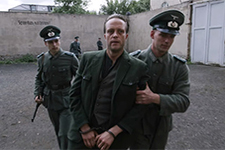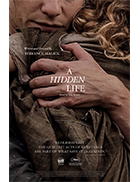A Hidden Life
|  The title of A Hidden Life, Terrence Malick’s latest elegiac cine-rumination on life and death and everything in-between, is taken from George Eliot’s sprawling 1871 novel Middlemarch, in which she wrote, “for the growing good of the world is partly dependent on unhistoric acts; and that things are not so ill with you and me as they might have been is half owing to the number who lived faithfully a hidden life, and rest in unvisited tombs.” Eliot (the pen name for Mary Anne Evans) was writing about the novel’s heroine, an ambitious young woman named Dorothea Brooke who gives up on her grand dreams of being a famous philanthropist to become, instead, a wife and mother—a “foundress of nothing,” in Eliot’s words. When Emily Esfahani Smith reflected on this passage in an essay in The New York Times a few years ago, she wrote, “It’s one of the most beautiful passages in literature, and it encapsulates what a meaningful life is about: connecting and contributing to something beyond the self, in whatever humble form that may take.” Malick’s film is thoroughly committed to the powerful idea that simply standing one’s moral and ethical ground, refusing to bow to pressure even if it seems, in the moment, that it won’t matter, is one of the most important acts one can make as a human being. It is a deeply humble act in its way, as it asks for no glory or fame or attention, but rather is justified in and of itself. In our era of vicious Trumpian politics and ambitions, in which the ends are always twisted to justify the means, the simple of act of doing the right thing for no other reason than because it is the right thing is genuinely radical. Such acts are radical all the more so because they are dangerous to tyrants, whose power rests largely on the willingness of otherwise good and decent people to look the other way, accept injustice and violence and cruelty if it maintains their perception of personal safety, and accept whatever rhetoric is handed down to them to justify it all. A Hidden Life is about an otherwise unremarkable man who did the opposite, committing his own life to doing the right thing in a way that even the best of us probably wouldn’t (although we tell ourselves we would). The film tells the true story of Franz Jägerstätter (August Diehl), a farmer from the tiny Upper Austrian village of St. Radegund who was conscripted into the German army during World War II but refused to swear an oath of allegiance to Hitler. Malick, whose films are usually studies in intense contrast, establishes the life of Franz, his devoted wife, Fani (Valerie Pachner), their three pre-adolescent daughters, Fani’s sister (Maria Simon), and Franz’s mother (Karin Neuhäuser) as a kind of rustic utopia, a place where, as he says in the opening voice-over narration, he thought they could fly away to like birds. Malick and cinematographer Jörg Widmer (who previously worked with him as a camera operator on The Tree of Life and To the Wonder) capture the sublime beauty of the region with roving, fluid camerawork that functions as a visual emphasis for Franz and Fani’s Edenic life, which is full of love and commitment and passion. It is not, of course, a life devoid of hard work, but their toil with the land—cutting grass with long scythes that constantly have to be sharpened, planting potatoes with their bare hands, plowing huge fields—is depicted as a life full of grace and fulfillment, a kind of oneness with nature that Malick’s films often prize as the quintessential achievement of human striving. Malick’s best films are the essence of the cinematic sublime, and there are moments throughout A Hidden Life where he achieves a kind of beauty that is genuinely rare and moving, which makes Franz’s ultimate sacrifice and willingness to submit himself to the gray walls of a Nazi prison all the more painful. Malick uses Franz and Fani’s idyllic rustic existence as a counterpoint to the inherent ugliness of the Nazi war machine, which he shows in both black-and-white newsreel footage and the grim scenes of Franz’s imprisonment. The walls around him seem so much more overbearing after having seen the vast, pure openness of his earlier life, which is slowly impinged upon by the Third Reich’s toxic, racist rhetoric (Franz’s friend, who is also the village mayor, drunkenly rants at one point about “outsiders” and “immigrants”). The correlations with our current political situation are undeniable, but still subtle enough to play primarily as subtext for those looking. Malick’s screenplay, which he based on Franz and Fani’s letters to each other, is reflective of his open, poetic approach to narrative, although this is easily his most “conventional” film in years. He still relies on voice-over narration, but there is substantially less of it than there has been in his more recent films and it is always clearly anchored to a specific character and context (often taken directly from Franz and Fani’s letters). The film is arguably too long—at nearly three hours, its middle section could have easily been trimmed, although the lengthy visual detours and repetition of imagery, much like repeating stanzas in a poem, are to be expected in a Malick film and arguably contribute to its overall tone. To return to Emily Esfahani Smith, her description of getting through Middlemarch is much like the experience of watching A Hidden Life: “it requires devotion and discipline, which is kind of the point. Much like a meaningful life, the completion … is hard won and requires effort.” All throughout the film, Franz is asked why he doesn’t just say the words of the oath to Hitler and spare himself and his family the anguish of his resistance? Why can’t he just say them and not mean them and then move along? Why can’t he, to put a fine point on it, be like all the other good Germans and Austrians who didn’t necessarily subscribe to Hitler’s genocidal cruelty, but weren’t strong enough to stand up to it? But, as Franz recognizes, words matter, and fascism takes root in the moments when we have the opportunity to confront evil and don’t. The power of Franz’s sacrifice is that there was no guarantee that anyone would ever know about it and it wouldn’t make any difference. It is as if the film is an answer to the question posed by Sean Penn’s hardened, cynical Sgt. Welsh to Jim Caviezel’s idealistic, rebellious Pvt. Witt in Malick’s The Thin Red Line (1998), “What difference you think you can make? One single man in all this madness?” The answer provided by A Hidden Life is “all the difference in the world.” Copyright © 2020 James Kendrick Thoughts? E-mail James Kendrick All images copyright © Fox Searchlight |
Overall Rating: 


 (3.5)
(3.5)


